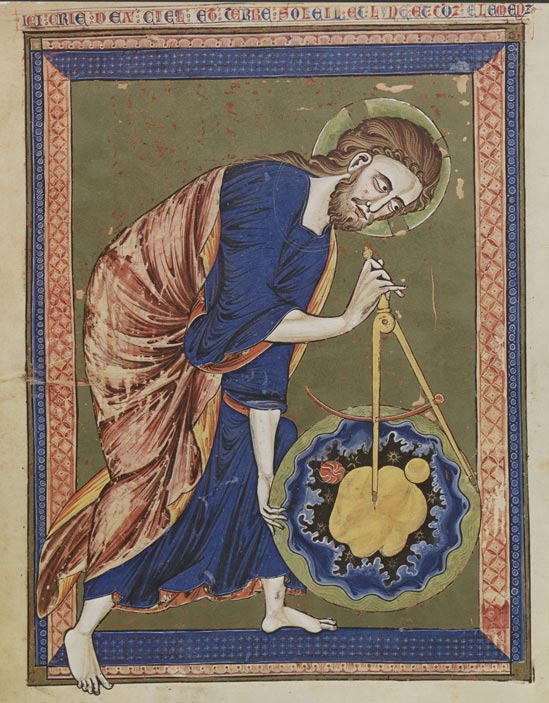The views expressed in our content reflect individual perspectives and do not represent the authoritative views of the Baha'i Faith.
Is Christ God?
To understand how the notion of an incarnate God developed, we have to start with Logos theology. The idea and meaning of God’s Word (Logos) may have had its origin in the Judaic Wisdom literature, for example in Proverbs 8, or in Platonic thought, but it first appears in Christianity in the letters of Paul. Around 56 A.D. Paul wrote that Jesus:
6. Who being in the form of God, thought it not robbery to be equal with God:
7. But made Himself of no reputation, and took upon Him the form of a servant, and was made in the likeness of men:
8. And being found in fashion as a man, He humbled himself, and became obedient unto death, even the death of the cross.
9. Wherefore God also hath highly exalted Him, and given Him a name which is above every name. – Philippians 2.
This King James translation not only gives God a form, but makes Jesus equal to it: Jesus is in “the form of God.” However, the New International Version of the Bible has a better translation: “…Christ Jesus, Who being in very nature God, did not consider equality with God something to be grasped.”
It is not God’s form—an aspect of physicality—but His metaphysical nature and spiritual attributes that He bestowed upon Jesus. Paul, then, was not speaking of physical incarnation. Paul continued his line of thought in a letter written between 6163 A.D. saying that the Son (Jesus):
15. … is the image of the invisible God, the first born of every creature:
16. For by Him were all things created, that are in heaven, and that are in earth visible and invisible, whether they be thrones or dominions, or principalities, or powers: all things were created by Him, and for Him:
17. And He is before all things, and by Him all things consist.
18. And He is the head of the body, the church: who is the beginning, the firstborn of the dead; that in all things he might have preeminence.
19. For it pleased the Father that in Him should all fullness dwell. – Colossians 1.
Here, we see clearly that to Paul, Jesus is not God, but created in the image or likeness of God. Images are not the same thing as the original—though they may reflect the intent of the original. Further, while the Christ (or Son, in some translations) described above exists before Jesus appears in history, even this pre-existent Christ is here described as a created being, born of God. Thus a double distinction is made between God and His created likeness. No incarnation of God is implied.
Elsewhere Paul strengthened the notion of preexistence by speaking of Jesus as being “sent” to earth. For example, Romans 8:3 reads: “For what the law could not do, in that it was weak through the flesh, God sending his own Son in the likeness of sinful flesh, and for sin, condemned sin in the flesh.” Here again, God was not sent in the flesh, but rather His Son (Logos) was sent in the “likeness” of flesh. Jesus was flesh, sure enough, but the God within him was not a physical incarnation. Rather, the spiritual reality of Jesus, the Divine Reality, only had a likeness (association) with the flesh of Jesus.
A little after the above letters were written, the first gospel, the gospel of Mark, was written around 70 A.D. This gospel emphasizes a difference between God and the Son. Jesus is characterized as the enigmatic Son of man, not the transcendent Son of God. Messianic titles are always put upon Jesus, not proclaimed by Him, and the question of what these titles mean is never dealt with.
The Baha’i view of Christ’s station honors Christ’s original teachings, and rejects the dogma that later interpreters and clerics developed:
It is an established fact that the followers of all the religions believe in a reality, the benefits of which are universal; which reality is a medium between God and man. The Jews call that reality Moses, the Christians Christ, the Moslems Mohammed, the Buddhists Buddha and the Zoroastrians Zoroaster. Now mark well that none of these religionists have ever seen the founders; they have only heard his name. Could they overlook these names they would at once realize that all believe in a perfect reality which is an intermediary between the Almighty and the creatures…. Religion should be the means of good fellowship and love. It must upraise the standard of harmony and solidarity….
His Holiness the Christ sacrificed his life, not that people might believe the doctrine that he is the word of God; nay, rather, he yearned to bestow the consciousness of continued existence. That is why he said, “Jesus, the son of man, is come to give life to the world.” His aim has been entirely obliterated and the doctrine of the father, son and Holy Spirit has been fabricated…. When we hold fast to the foundation of religion, differences will disappear. – Abdu’l-Baha, Divine Philosophy, pp. 155-157.
You May Also Like
Comments


















One of the biggest eye-openers to me was Christ's discourse in the Garden of Gethsemane, which was His last message to His disciples before He left them. It struck me as I read them seeking to understand the foundations of church doctrine that what Christ would convey here was the essence of His teachings, so I was stunned ...to find no mention of the Trinity, His divinity, exclusivity, crucifixion, or resurrection—the things I had learned as fundamentals of faith—but only that it was His word that purified us, that what He asked was obedience to His command and that His sole command (repeated three times for emphasis) was "Love one another."